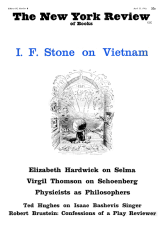In response to:
Beyond the Fringe from the March 25, 1965 issue
To the Editors:
I am grateful to Mr. Lichtheim for calling my Dreamers, Dynamiters, and Demagogues “an enjoyable book” (NYR, March 25). I also enjoyed his jokes at my expense. However, I am afraid that, in some respects at least, the joke is on him. Zeno the Stoic, whom I mentioned in my dedication as a “titan of protest,” was chosen by me because his Republic—unfortunately lost—is generally considered to have been the first exposition of an anarchist philosophy. In referring to “my” Zeno as a skeptic, Mr. Lichtheim must have confused him with the other Zeno, the one of the Eleatic school, who, as far as I know, is usually mentioned in the pedigree of philosophical skepticism. Hence “my” Zeno would have hardly “doubted [my] existence.” He was a humanitarian; so he would not have refused to give a break to a humble “comrade” laboring in the same anarchist vineyard.
I can also assure Mr. Lichtheim that Anatole France would not have “declined the honor” of being listed as one of my favorite writers. Despite his partiality for aristocratic ladies and cheap “actresses,” and despite the ridicule with which he treated the anarchists in his Revolt of the Angels, he had a soft spot for utopians and rebels; and the super-“dynamiter” who, at the end of his Penguin Island, uses a radium bomb and blows up Paris as the symbol of our rotten civilization, has all his sympathy.
I wonder what is so funny or incongruous in my including Spartacus, John Brown, and Karl Liebknecht among the eight “immortal rebels” to whom I dedicated my reminiscences. It is news to me that anarchists are supposed to admire only revolutionary heroes belonging to their “party.” Bidbey-Romanov, one of the most rabid and most brilliant Russian anarchists of the 1900s, dedicated one of his pamphlets “to all heroes of the People’s Will,” i.e., the so-called and misnamed “Nihilists.” Yet these terrorists were not anarchists but essentially what one might call “bourgeois democrats.”
Spartacus, as far as I can figure out, was not a believer in dialectical materialism, yet Karl Marx mentioned him on one occasion as his favorite hero. Karl Liebknecht was not an anarchist, but he was loved and admired by all anarchists for offering to defend, free of charge, one of my friends implicated in experiments with explosives. And as to John Brown—whose name prompted Mr. Lichtheim to use an exclamation mark—well, wasn’t he the aspiring Spartacus of America’s Negro slaves? I have, of course, in mind the John Brown of Harpers Ferry fame and not his namesake who rendered valuable services to Queen Victoria. Is it possible that Mr. Lichtheim, who confused the two Zenos, should have confused the two John Browns as well? I wonder.
Max Nomad
New York City
George Lichtheim replies:
Stoicism and skepticism are historically related: both made their appearance after the polis had collapsed and political life was at an end, individualism taking its place. The Eleatic Zeno (though considerably earlier than his Stoic namesake) therefore struck me as a suitable choice, but I did not expect my joke to be taken quite so literally. I do want to stress that it was a joke, and that I was told about the two Zenos in the gymnasium I frequented in my youth. As for Liebknecht, if Mr. Nomad is going to annex respectable Social-Democrats to the Anarchist cause, he may run into trouble with some of his own followers. It is all the same to me, but as long as he was looking for martyrs he might have mentioned Gustav Landauer, who really was an Anarchist, instead of the better known Liebknecht, who was not.
This Issue
April 22, 1965



